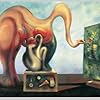Upamanyu Sengupta
asked:
Why do people think that the life of stevens was a waste ? Yes he does indeed have some regret but that does not mean he wpuld have been happy if he changed something in the past ,like for eg if he left the job or if he stopped miss keaton that evening and married her later.He might have had an uneventful life and would have had other regrets.Suppose ,what if lord darligton was not chastised but acclaimed universally.
To answer questions about
The Remains of the Day,
please sign up.
Shaz
That's an interesting question.
Readers feel that his life was a waste because we have the benefit of hindsight.
Steven did not have this, and he made decisions which he felt was right at that moment in time.
The book shows us the futility of looking back and wondering how things could have been if one would have made different choices. The point being that had he left his job or stopped Miss Kenton - he could still be looking back and wondering if he would have been one of the great butlers, had he not left the job.
The idea is that we should look back in the past for self-reflection - to inform our choices in the future - not to lament our decisions. And if we are honest and reflect properly, we might be able to make the most out of what remains of the day.
Readers feel that his life was a waste because we have the benefit of hindsight.
Steven did not have this, and he made decisions which he felt was right at that moment in time.
The book shows us the futility of looking back and wondering how things could have been if one would have made different choices. The point being that had he left his job or stopped Miss Kenton - he could still be looking back and wondering if he would have been one of the great butlers, had he not left the job.
The idea is that we should look back in the past for self-reflection - to inform our choices in the future - not to lament our decisions. And if we are honest and reflect properly, we might be able to make the most out of what remains of the day.
Genevieve
This answer contains spoilers…
(view spoiler)
Huck Flynn
I think the power of the novel is that the reader recognises something vulnerable in Stevens behind his veneer of "butlerhood" and is rooting for him to overcome his reticence and discover himself as a free individual. It's the classic unreliable narrator where we think we know the truth behind his narrative - the attraction between him and Miss Kenton is revealed subtly through her actions and words rather than his own, until it is too late. On a personal level his life, as far as we witness it, is a waste because it is built on artificial subservience to somebody superior in social class but not character, and represses his natural emotional needs. However, how much less a novel if he'd had a sudden epiphany and run off with Miss Kenton !
MTK
I think because both his obsession with being the perfect butler drive him to professional and his romantic choices lead to failures? On a personal level, he is so focused on his job that he fails to understand that Miss Kenton loves him and lets her go to marry someone else. If he had attempted a relationship, they might have married and had children and he would now have a wife and family instead of being a solitary old man. He probably wouldn't even have to leave his job; if Anthony Trollope and Agatha Christie are to be believed, it would have been very suitable for the butler and the housekeeper to be a married couple.
On a professional level, the problem with devoting yourself to the service of one person is that your life's work depends on their success. He chose to devote himself to Lord Darlington, who made dreadful mistakes in choosing to involve himself with international politics. If Lord D was right about Germany wanting peace, or if he had realised early on what was happening with the Nazis, Stevens might have ended up the butler of an internationally renowned statesman, or at least a respected old aristocrat, and the house might have stayed in the family after his death. Instead he had to see his master become disgraced and die alone and the house go to a stranger.
On a professional level, the problem with devoting yourself to the service of one person is that your life's work depends on their success. He chose to devote himself to Lord Darlington, who made dreadful mistakes in choosing to involve himself with international politics. If Lord D was right about Germany wanting peace, or if he had realised early on what was happening with the Nazis, Stevens might have ended up the butler of an internationally renowned statesman, or at least a respected old aristocrat, and the house might have stayed in the family after his death. Instead he had to see his master become disgraced and die alone and the house go to a stranger.
Matthewkyle130yahoo.Co.Uk
It's impossible to say whether anyone's life is a "waste". Stevens set out to become something and he achieved that goal. The goal was flawed, yes, but so are all goals. I think Stevens derived a great satisfaction from his decades as a butler and his moment of regret at the end of the novel doesn't negate that. The fact is, anyone who seeks to encapsulate a virtue (such as dignity) has to sacrifice a lot to achieve that goal. Stevens was willing to sacrifice and for that I think his life and character are quite admirable.
Laura
It depends upon what each reader believes to be a meaningful life, I suppose. Stevens was valuing what he was raised to value -- dignity, service to a great house -- and perhaps not valuing those things that his upbringing did not emphasize: love, companionship, close family relationships.
Chris
This answer contains spoilers…
(view spoiler)
About Goodreads Q&A
Ask and answer questions about books!
You can pose questions to the Goodreads community with Reader Q&A, or ask your favorite author a question with Ask the Author.
See Featured Authors Answering Questions
Learn more








